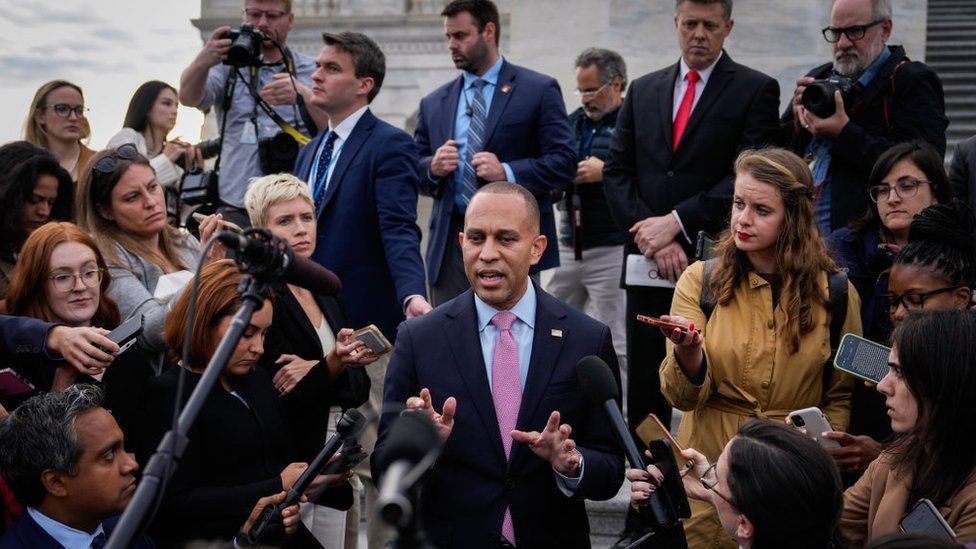Jim Jordan’s quest for the speakership of the House has been off to a rough start
While the pick of the majority of House Republicans projected confidence at the beginning of this week, two rounds of balloting have exposed significant resistance to his bid for the gavel.
On Tuesday, 20 of his fellow Republicans opted to support someone else. That number grew to 22 with a second vote on Wednesday, plunging his leadership bid into disarray.
The Trump-backed congressman had chosen to hold these public votes as part of a strategy to flush out opposition. He hoped to expose the nay votes as just a handful of holdouts and put them on the record, where they would wilt under the spotlight.
Instead, the strategy revealed the strength and determination of his opposition. Despite reporting that they have received death threats and faced other less severe means of pressure, Mr Jordan’s Republican critics say they are united and undeterred.
It sets up a standoff where, at some point, one side will have to give way.
So what happens next?
Jordan keeps fighting
The Ohio congressman could continue to press for more Speaker votes. He has Mr Trump and much of the right-wing media ecosystem on his side, and can make life very uncomfortable for Republican politicians who are viewed as insufficiently loyal to the conservative cause.
Unlike Mr McCarthy, who in January faced an ideologically cohesive group of right-wing conservatives with specific, although difficult to satisfy, demands, Mr Jordan confronts a somewhat disparate group of opponents.
There’s a knot of legislators from narrowly won districts in New York who may be fearful that Mr Jordan’s brand of confrontational politics will damage their re-election chances.
Another group includes key members of the House Appropriations Committee, including its chairwoman, Kay Granger. They might be worried about Mr Jordan’s penchant for budget showdowns and resulting government shutdowns undermining their carefully negotiated and constructed government-funding legislation.
The rest are an ideological hodgepodge from across the country, whose opposition ranges from tepid to vehement.
Mr Jordan and his team will have to try to find ways to cajole or coerce his opponents into yielding while not doing so in a way that alienates his current crop of supporters.

It will be no easy task.
Twenty votes is more than Kevin McCarthy, the recently ousted speaker, lost in his first ballot in January, during a process that stretched over several days and through 15 rounds of votes. It seems unlikely that Mr Jordan’s fellow Republicans will give him that much time to secure the Speaker’s gavel, given the current national and global circumstances.
Mr Jordan can only afford to lose four Republican votes.
Republicans go back to drawing board
At some point, if Mr Jordan cannot demonstrate he is making progress towards winning the Speaker vote, Republicans are going to have to start looking for other options.
Some have already floated giving Mr McCarthy, who was only narrowly unseated two weeks ago, another chance at the gavel. Since his ouster, no Republican candidate has matched his level of support among House Republicans.
Another option being floated is to expand the powers of acting Speaker Patrick McHenry, allowing him to preside over urgent legislative matters, like approving aid to Israel after the Hamas attack.

A majority of the House would probably have to approve this step, but some Democrats could go along if the scope of Mr McHenry’s powers are clearly defined. They might demand concessions in exchange for their support, as well.
Some centrist Republicans have also broached the possibility of working with Democrats to form a coalition that can elect a centrist compromise Speaker. Democratic leader Hakeem Jeffries has been open to such an effort, although he says that such a move will have to allow Democrats to advance some of their own legislative priorities.
Otherwise, Republicans are left hoping that a new candidate can emerge who will pull their party together and willingly accept what Republican congressman Ken Buck of Colorado recently described as the “worst job in America”.
Source: BBC
